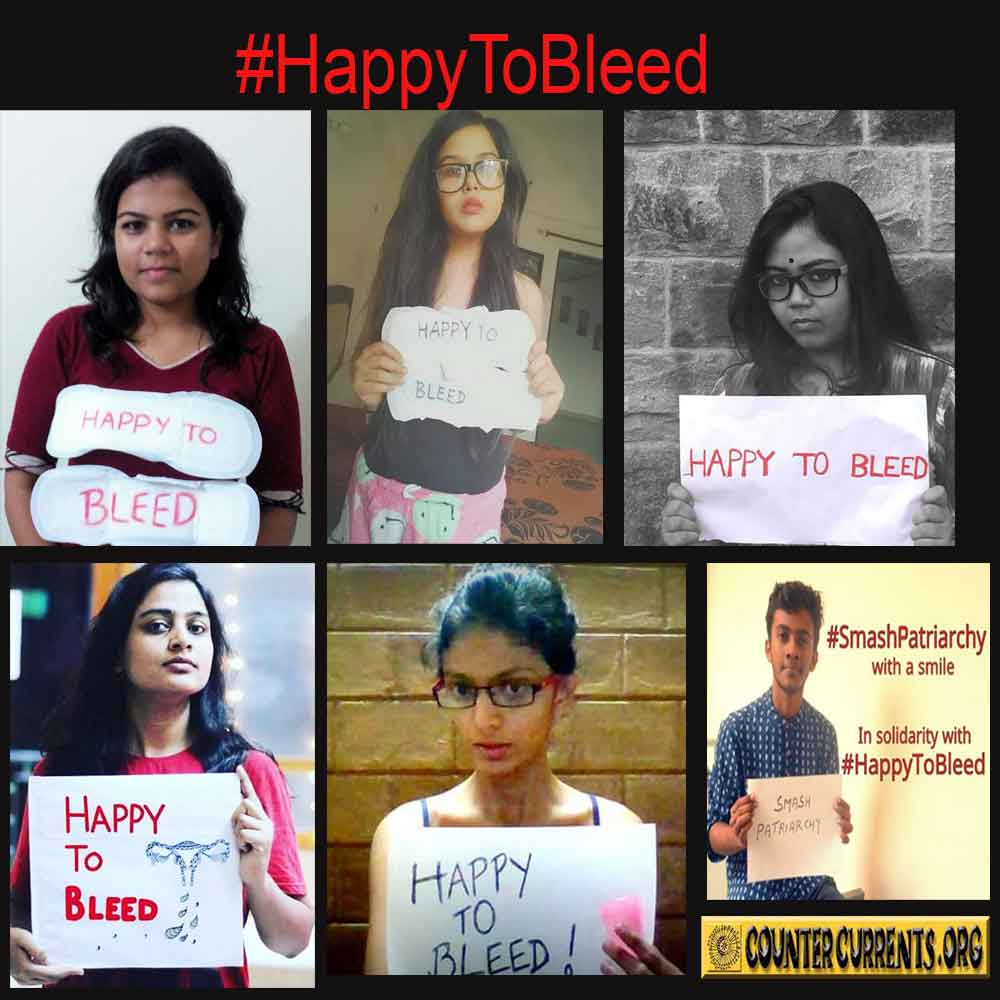#HappyToBleed: An Initiative Against Sexism
By Nikita Azad
23 November, 2015
Countercurrents.org

Friends, #HappyToBleed, as a campaign was launched on November 21, 2015 as a counter attack against the sexist statement given by Devaswom chief, Sabrimala Temple, Kerala. The campaign has been receiving great response from women of all sections and has gone viral on facebook. The open letter written by Nikita Azad has been widely shared, appreciated, and criticised at the same time. But, along with it, some crucial questions have been raised by progressive fellow mates like why is the hashtag "Happy" being used when everybody knows that menstruation is actually a painful activity.
There is no doubt that during menses, a woman experiences pain, and we nowhere are trying to escape from reality. However, words create their own meanings when we contextualise them in specific historical circumstances. Happy, as a word, is used as a satire, a taunt, a comment, on patriarchal forces which attach the understanding of purity-impurity of women with menstruation. Also, since menstruation is criminalized whose perpetrator is woman, #happy as a tag breaks with this hegemonic belief. A lot of other slogans are being used in the campaign by women participants like Lal Salaam, Smash Patriarchy, I don't bleed blue, I bleed red etc which are equally relevant and increase the range of the campaign. We would certainly welcome other slogans which speak against feudal-patriarchal culture.
There have been questions that the campaign is detached from masses, or lacks the correct understanding etc. The campaign started as a social media campaign, to reach the people who use internet, in the first place. But, with the awesome response that it is receiving, it may appear to people as a ground activity. We nowhere claim that this is a final campaign, but consider it as an initial initiative in breaking with the stereotypes.
Some friends have argued that we actually don't need to enter the temples, or follow a religion which discriminate, for that matter. Let us be clear, this is not a temple-entry campaign. This campaign is an initiative against sexism, and the taboos it uphold since ages. The class structure has created various forms of patriarchy like locking women in kitchens, reducing her contribution in production processes, considering her a reproductive machine, attaching the 'honour' tag, objectifying her as an object of sexual pleasure, impurity during menses etc. While recognising all manifestations, we particularly chose menstrual taboos as an immediate response to the statement, but it does not mean that we do not acknowledge more acute representations.
It is important to mention that such statements/practices affect working class women, and Dalit women the most. A study by AC Neilsen informs us that 88% women resort to shocking alternatives like unsanitised cloth, ashes and husk hand, while 70% women cannot afford to use sanitary napkins. It also states that around 23% girls actually drop out of school after they start menstruating. Thus, the statement/practices add to the misery of these women, who are already under class, and caste oppression. Already a lot of discrimination is done in our society along caste lines, like keeping separate utensils, opposing inter-caste marriages etc, such a statement intensifies gender-caste oppression whereby a community is tagged as 'impure'. This attribution of half the world as impure is not on some utopian beliefs but objectively existing realities which have kept women isolated from land, the only source of production, since ages. Less than 3% women in the world own land which reflects the patriarchy in production processes. At such a juncture of time, statements like these legitimise the gender discriminatory practices, and must be met with fearless resistance.
In the end, we urge women to participate in the campaign, by uploading their pictures, holding placards/sanitary napkins, and using slogans that they consider relevant. Also, we appeal to men to participate in the campaign by quoting that they support it, so as to break with men-hating myth that is being built. We request all democratic, progressive individuals, organizations to lend support to the campaign, and register their response against misogyny.
LAL SALAAM
Nikita Azad is a student, gender rights' activist from Patiala, Punjab

